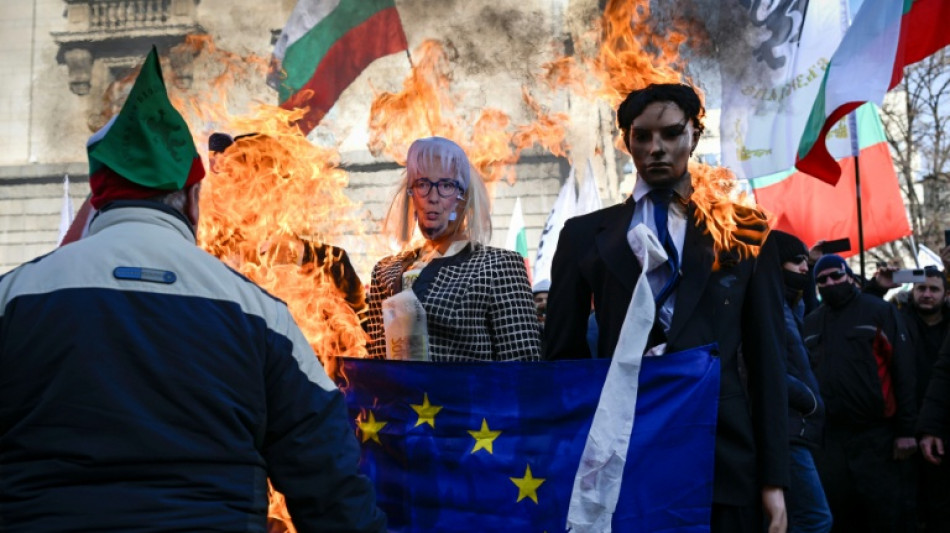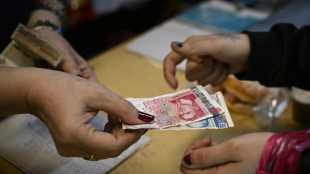
| JRI | 0.11% | 13.595 | $ | |
| SCS | 0.12% | 16.14 | $ | |
| RIO | -0.46% | 80.154 | $ | |
| BCE | 0.88% | 23.78 | $ | |
| GSK | -0.42% | 49.096 | $ | |
| CMSC | -0.06% | 22.67 | $ | |
| BCC | -0.05% | 73.75 | $ | |
| CMSD | -0.22% | 23.08 | $ | |
| BTI | 0.19% | 56.66 | $ | |
| NGG | -0.37% | 77.48 | $ | |
| RBGPF | 0.42% | 81.05 | $ | |
| RYCEF | 0.83% | 15.58 | $ | |
| RELX | -0.7% | 40.825 | $ | |
| VOD | -0.15% | 13.21 | $ | |
| BP | -0.14% | 34.701 | $ | |
| AZN | -0.47% | 92.08 | $ |

EU member Bulgaria faces protests over adopting the euro
Bulgaria is expected to get a green light from Brussels in June to adopt the euro -- but the prospect is unsettling many citizens.
"If Bulgaria joins the eurozone, it will be like boarding the Titanic," Nikolai Ivanov, a retired senior official, told AFP at a recent protest calling for the country's currency -- the lev -- to be maintained.
Since January, opponents of Bulgaria adopting the common European currency have launched demonstrations and demanded a referendum on the issue, amid a torrent of disinformation.
Memories of a 1996-1997 economic crisis that saw 14 banks go bankrupt and hyperinflation of more than 300 percent also resurfaced, fuelling the opposition.
Several recent surveys showed nearly half of those questioned said they were opposed to Bulgaria joining the eurozone.
The debate has reignited anti-EU propaganda, and many of those opposed to adoption of the euro have taken to waving Russian flags.
Bulgaria, which joined the European Union in 2007, is the poorest nation in the bloc.
And "the poor are afraid of becoming even poorer", said Boriana Dimitrova, director of the Alpha Research institute.
That, coupled with a mistrust of institutions after years of instability, has created fertile conditions for the population of 6.4 million to fear economic change.
That fear has been stoked by some political groups, including the far-right Vazrazhdane party, which called for a new anti-euro rally on Saturday in the capital.
The country's pro-Russian president, Rumen Radev, made a surprise announcement in early May also calling for a referendum on the matter.
This week, he accused the government of not implementing needed measures to allow the "most vulnerable" to withstand the shock of euro adoption.
- Pro-EU voices struggling -
A third of Bulgarians faced the threat of poverty or social exclusion last year, according to Eurostat figures.
People particularly in small towns and rural areas are reluctant to adopt the single currency, with some of them having never travelled abroad and not used to international transactions.
Disinformation widely shared on social networks claims, falsely, that with the introduction of the euro, "Brussels will confiscate your savings to finance Ukraine".
Dimitrova told AFP that Radev was making "a well-calculated political move", appealing to a disillusioned segment of the electorate.
But his referendum proposal, deemed "unconstitutional", sparked an outcry from legal experts, and from Assembly Speaker Natalia Kiselova, who refused to put it to a vote.
Meanwhile, pro-European voices are struggling to be heard.
"In Sofia and the larger cities, the population -- wealthier, better educated and younger -- sees it as a logical next step in the European integration process," Dimitrova said.
Institutions and banks are already prepared, and the coins' design has been chosen, with the local two-euro coin showing off the inscription "God protect Bulgaria".
But in a sign of the lack of information and a feeling of inferiority that is still widespread in the country, "some people still ask me if the Bulgarian euro will even be valid in France or Germany", Dimitrova said.
M.Pellegrini--GdR


